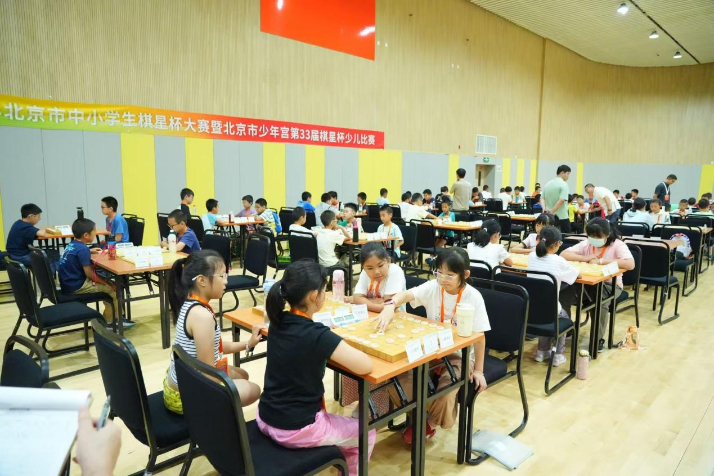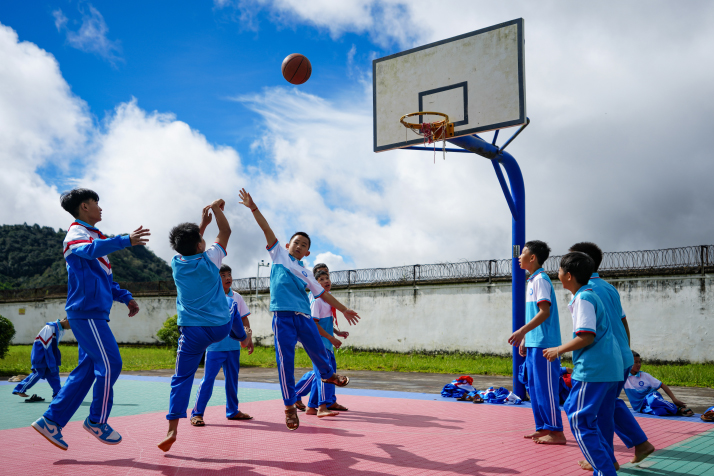| China |
| China's holistic push for student mental wellbeing | |
|
|
 Students play Chinese chess at the Chess Star Cup competition hosted by Beijing Children's Palace on July 16 in Beijing (COURTESY PHOTO)
A shift is underway in schools across China, with more emphasis put on the inner wellbeing of students. In mid-October, the Ministry of Education (MOE) issued 10 measures to further strengthen the mental health of primary and secondary school students, a comprehensive policy aimed at tackling the growing psychological pressures faced by children and adolescents. The document represents one of the most systematic efforts to date to safeguard students' emotional and psychological development. It arrives at a critical time, with rising social concerns over anxiety, depression, obesity and social isolation among young people. "I'm genuinely worried about my daughter. She is having a totally different student life from the one I had and from what I had expected, and she seems to be shouldering responsibilities and academic pressure unfit for her age," 42-year-old Zhu Lin, a parent of a middle school student in Beijing, told Beijing Review. She added that because of the generation gap and young people's rebellious natures, she has failed to communicate with her daughter properly. "She eats too much. She spends too much of her time studying and scrolling on her phone, refusing to talk with us about what's happened or to go out to have fun on weekends. I believe it is high time that we start paying attention to children's mental wellbeing," Zhu said. The MOE is stepping in with a multi-pronged approach, including measures related to reform to reduce academic burden on students, encouraging physical exercise, management of electronic devices on campus, collaboration between parents and schools, and emotional support.  Students play basketball at Lafu Primary School in Pu'er City, Yunnan Province, on September 15 (XINHUA)
Systemic response "A large amount of scientific evidence shows that a lack of sleep, insufficient physical exercise and excessive time online can damage the brain structure and function, which in turn has a major impact on cognitive learning and psychological capacity," Dong Qi, chief member of the National Advisory Committee for Students' Mental Health, told China Media Group. "The measures are systematic, substantive and comprehensive. But what matters most is how we put the measures into effect and establish relevant procedures for oversight to make sure that they bring benefits to students." One of the most talked-about measures is the push to ease academic anxiety. Schools are encouraged to set a weekly "no homework day," cut down on repetitive and punitive assignments, and reduce the frequency of tests. Ranking students by test scores is explicitly forbidden. Beyond the classroom, the policy also calls for reforms in high school admissions, including giving equal admission opportunities to students to enter top schools and promoting more balanced distribution of educational resources. Dong said reducing differences in quality between schools will reduce the pressure on parents caused by the rat race to get their children into better ones. "Every parent wants a good education for their children, but educational resources are still uneven. If we can improve the quality and balance of basic education, a lot of parental anxiety will fade naturally," he said. "We've heard of the restrictions on homework and appeals to cut it down for many years, and the workload is, to a certain degree, reduced on holidays and weekends. But this is not very helpful in reducing academic anxiety at large, since my classmates seek extracurricular tutoring to fill in their spare time, which leads to a rat race among students. I have no choice but to sign up for classes to catch up with them," a middle school student surnamed Chen from Langfang, Hebei Province, told Beijing Review, adding that his extracurricular classes per week have now hit 10 hours. "The helpful measure would be reforms to high school admissions exams and to rebalance resources. That way, I would not be pressured to get into a better school." Psychological shield Perhaps no measure has garnered as much enthusiasm among students as the call for two hours of daily physical activity. Under the new framework, every student in compulsory education (grades 1 to 9) should have access to meaningful, sweat-inducing exercise, including class-versus-class competitions. Schools are also encouraged to extend break times and to open sports facilities to communities after school. "When children participate in these activities, they don't just enjoy sports: They also learn to face challenges and build psychological resilience," Wang Pan, Deputy Director of the Beijing Municipal Education Commission, told China Media Group. Behind the move is a growing body of research linking physical activity to emotional wellbeing. "On a physiological level, exercise promotes the release of endorphins and serotonin—what we might call 'happy hormones,' while reducing cortisol, the stress hormone. It also improves sleep quality, which is the foundation of emotional regulation," Hao Xingjie, Director of the Sports Teaching Department at Beijing Children's Palace, an institution offering government subsidized extracurricular activities for children, told Beijing Review. "In psychological terms, sports teach focus, perseverance and how to handle both victory and defeat. Socially, they create a space for real interaction, teamwork and the safe release of emotions," Hao added. Hao's department has built what he calls a "four-pronged" system, including courses, training teams, competitions and camps, to help students grow through physical activities after class. "We have established professional teams for various age groups across primary and secondary schools, and provided them with systematic training and regular participation in competitions," Hao said. "Summer camps featuring emerging sports such as kayaking and rock climbing have also gained widespread popularity among students and parents." "Through the events and camps, I see clear improvements in emotional control, cooperation and self-awareness. Two hours of sports everyday will undoubtedly contribute to students' mental health and better academic performance," Hao said. Support systems The MOE's newly released 10 measures also take aim at two other major disruptors of mental equilibrium: sleep deprivation and digital overload. Schools have been instructed to adjust schedules to protect rest time, discourage early arrivals and incorporate napping where possible. Sleep quality will now be part of student health evaluations. At the same time, the policy tightens rules on smartphones and other devices in schools, promotes "screen-free time" at home, and urges online platforms to prevent potentially harmful content from reaching users under 18 years old, including content that fuels anxiety or unhealthy competition among students. For the most vulnerable students, including orphans, those from single-parent families and those left behind with grandparents in rural areas by parents working in cities, the guidelines prescribe tailored support. Each will have a personal psychological file and receive regular home visits. Boarding schools are encouraged to improve living conditions and emotional care. "The standout feature of the 10 measures is that they pinpoint the structural causes of student mental stress," Liu Xiya, Secretary of the Chongqing Xiejiawan School Committee of the Communist Party of China, told newspaper People's Daily. "They're not just alleviating symptoms, but are aimed at reshaping the educational environment." "These steps are both practical and systemic. They address the root of the problem, which isn't just about psychology—it's about the culture of schooling and education itself," Liu added. Copyedited by G.P. Wilson Comments to zhangyage@cicgamericas.com |
|
||||||||||||||||||||||||||||||
|